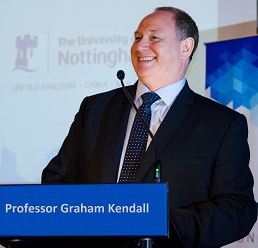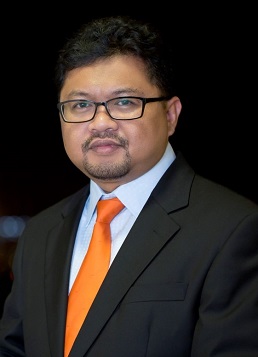KEYNOTE SPEAKERS
KEYNOTE SPEAKER 1

Professor Graham Kendall
Provost and CEO of The University of Nottingham Malaysia Campus (UNMC)
Professor Graham Kendall is the Provost and Chief Executive Officer (CEO) of The University of Nottingham Malaysia (UNM). He is also a Pro-Vice Chancellor (PVC) of the University and sits on the University’s Executive Board. Before becoming an Academic, he worked in the IT industry for 20 years, starting his career as a computer operator, and progressing to a senior manager. In 1994 (aged 34) he took a break from his industrial career and went to UMIST to study Computation, obtaining a First Class Honours degree. Debating whether to return to industry to work on the Y2K bug, he decided to undertake a PhD, which he started in 1997 and competed in 2000. In 1999, he was offered an academic position at the University of Nottingham.
He was made a full Professor in 2007 and moved to Malaysia in August 2011, where he took up the role of Vice-Provost (Research and Knowledge Exchange). In August 2016, he became the Provost/CEO of UNM and also was appointed a PVC of the University. He a Fellow of the British Computer Society (FBCS) and the Operational Research Society (FORS). He is a Director of two companies (Nottingham Green Technologies Sdn Bhd and Nottingham MyResearch Sdn Bhd) and a former Director of Crops for the Future Sdn Bhd. He is an Associate Editor of 10 journals and a former Editor-in-chief of the “IEEE Transactions on Computational Intelligence and AI in Games”. He has published over 250 peer reviewed scientific papers, with over 100 of those in ISI ranked journals.
His research interests/expertise include Operations Research, Evolutionary Computation, Artificial Intelligence, Heuristics, Meta-heuristics, Hyper-heuristics and addressing Real World Applications.
Title : Hyper-heuristics: Where they came from and the state of the art
Abstract
Hyper-heuristics comprise a set of approaches that are motivated (at least in part) by the goal of automating the design of heuristic methods to solve hard computational search problems. An underlying strategic research challenge is to develop more generally applicable search methodologies. The term hyper-heuristic is relatively new; it was first used in 2000 to describe heuristics to choose heuristics in the context of combinatorial optimisation. However, the idea of automating the design of heuristics is not new; it can be traced back to the 1960s. The definition of hyper-heuristics has been extended to refer to a search method or learning mechanism for selecting or generating heuristics to solve computational search problems. Two main hyper-heuristic categories can be considered: heuristic selection and heuristic generation. The distinguishing feature of hyper-heuristics is that they operate on a search space of heuristics (or heuristic components) rather than directly on the search space of solutions to the underlying problem that is being addressed. This talk presents a discussion of the scientific literature on hyper-heuristics including their origin and intellectual roots, a detailed account of the main types of approaches, and an overview of some related areas. Current research trends and directions for future research are also presented.
KEYNOTE SPEAKER 2

M.Haikal Bin Saripan
IP Network Consultant for Telekom Malaysia
Graduated from Kindai University, Osaka, Japan
20 years of working experience with 15 years in IP Network Operation
M.Haikal Bin Saripan started his career in April 2000 as a network enginner in Network Development Division in charged on development of IP Backbone for TM IP Network.
In July 2004, he had moved to IP Network Operation to manage and operate IP Network in several areas including Team Lead & TAC Engineer of Network Operation Center 24x7 and 2nd Level Support
He had been promoted to be the Technical Manager of IP Facilities Management in July 2007 then later had been reassign to be the Technical Manager of TM IP Core Network in Feb 2008 to develop, manage and operate the new TM IP Core Network that support TM HSBB Project. He is also had been appointed as the only IP Network Expert in TM IP Network Operation in 2011.
Promoted to be the Assistant General Manager of IP Technology Management in 2012 to oversee overall IP Network Operation and Management. In Feb 2014, he had been appointed as IP Network Consultant in TM IP Network Operation to oversee end to end IP Network post implementation.
He is also a member of TM IP Architecture board in 2009 and later the Chairman of TP IP Architecture board in 2019.